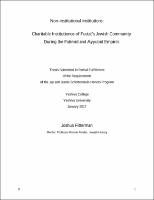Please use this identifier to cite or link to this item:
https://hdl.handle.net/20.500.12202/4108| Title: | Non-institutional institutions: Charitable Institutionos of Fustat’s Jewish Community During the Fatimid and Ayyubid Empires |
| Authors: | Fitterman, Joshua |
| Keywords: | Jews --Egypt --Cairo --History --11th century. Jews --Egypt --Cairo --Social conditions --11th century. Jews --Egypt --Cairo --Charities --History. Poverty --Religious aspects --Judaism. Judaism --Charities --History. Jews --Egypt --Social conditions. Poor --Egypt --History. Cairo Genizah. Fusṭāṭ (Cairo, Egypt) --History --11th century. |
| Issue Date: | Jan-2017 |
| Publisher: | Yeshiva College |
| Abstract: | A distinguishing feature of Jewish communities past and present from other religious systems is the degree of importance placed upon supporting poverty stricken individuals. From the biblical injunction to give a portion of every third harvest as "Ma'aser Ani” (the poor tithe) to the modern programs of the United Jewish Federation, we find that Jewish communities place great emphasis on providing for at least some of the needs of the poor. A larger discussion of the origins of Jewish charity from biblical times to the modern era is still unwritten.1 What is less well known, but beginning to draw the attention of scholars, is how these post Temple-era practices developed in various diaspora communities. |
| Description: | The file is restricted for YU community access only. |
| URI: | https://hdl.handle.net/20.500.12202/4108 https://ezproxy.yu.edu/login?url=https://repository.yu.edu/handle/20.500.12202/4108 |
| Appears in Collections: | Jay and Jeanie Schottenstein Honors Student Theses |
Files in This Item:
| File | Description | Size | Format | |
|---|---|---|---|---|
| Joshua-Fitterman.pdf Restricted Access | 476.94 kB | Adobe PDF |  View/Open |
This item is licensed under a Creative Commons License

